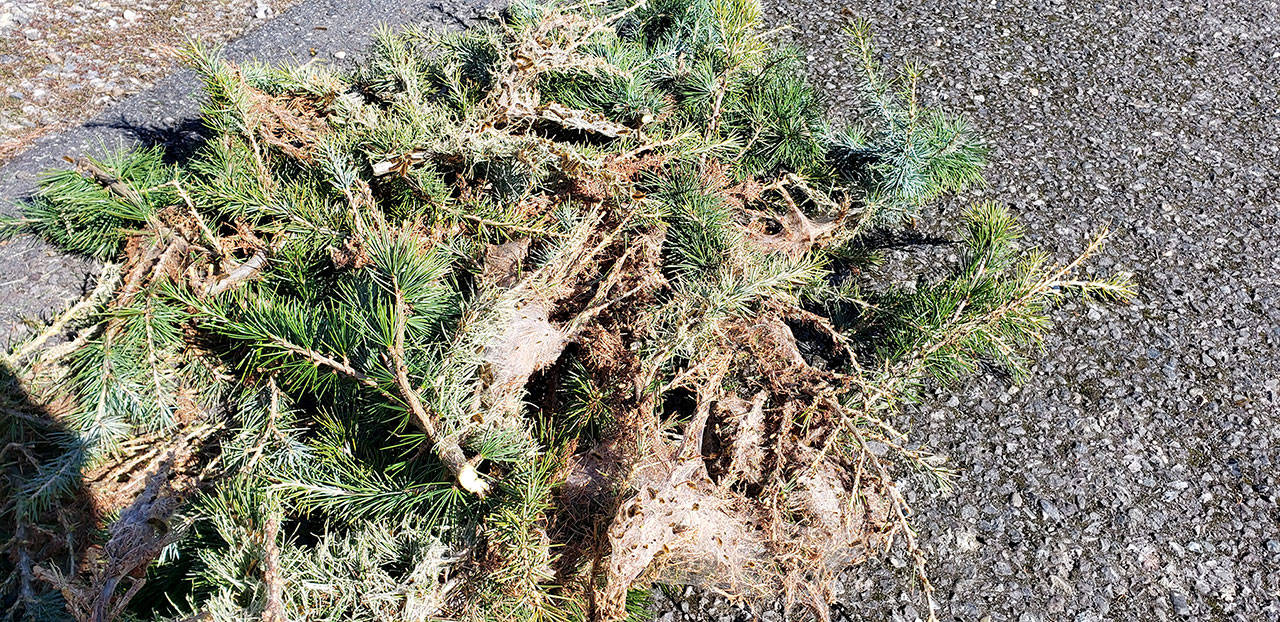They’re baaack.
I think invoking an infamous horror movie is so apropos because these voracious demons not only terrorize your trees but leave an eerie, disgusting, leaf-stripped plant loaded with abandoned, feces-filled, discarded bags that horrify anyone’s sense of aesthetics.
Of course, I could only be talking about the recurring scourge known as the Western tent caterpillar.
Unfortunately, these little monsters were seen quite heavily in the trees last year, working their way up U.S. Highway 101 from the Hood Canal.
I knew this was going to be bad news for us here on the Olympic Peninsula this year, and sure enough, two weeks ago I saw them on a deodara tree out at Diamond Point.
Then just last week, very good friends in Port Angeles had a large Western red cedar with these little beasts already devouring the “dead tree walking.”
Making matters even worse, there are at least six current recognized sub-species and they prey on various shrubbery.
This is why I saw them first on these two conifers, even though we normally associate them menacing alder, maples and other deciduous trees.
Regardless, they are gregarious and spend a good deal of their time with their colonies, constructing ever-expanding silken “tents.”
What makes them manageable is the fact that the tent caterpillars are univoltine, going through only one reproduction cycle a year.
In late summer, adult moths lay eggs on the sunny side of trees, emerging as hungry little foliage-devouring henchmen in early spring.
Fortunately, although they lay waste to the host plant, their damage is rarely, if ever, fatal.
But again, the impact to the plant seems horrific.
So what is the gardener to do? I doubt one can just grab a pitchfork or a torch and confront these abominations.
First, on the sunny side of smaller shrubs, trees and bushes, look for the little half-inch-long gray, bubbly Styrofoam-looking formations and squash them.
Do that now.
Next, and most importantly, be vigilant.
Look for them early and often.
They eat their weight several times over every day. Got that? Several times their weight a day, so get these barbarians as soon as possible.
One of the easiest ways is to cut them out of the plant when you see the small tent beginning to materialize.
Always use a proper pruning technique when “chopping out” their lair.
Next, and especially for taller, hard or impossible areas to reach — spray them.
A “host specific” treatment is to spray them with BTK (bacillus thuringiensis kurstaki), a biological control.
They also are controlled naturally by birds and a parasitical wasp that lays eggs in the body of the caterpillar.
In a classical “predator/prey” cycle, these two nemeses bounce up and down so severe infestations occur every 6 to 8 years.
So please, please, please protect your plants from the horror of being devoured alive and seek out and destroy these demons.
Also, in the same vein, get after slugs, mice and shot-weed because spring has sprung and it’s a race against petulance.
Next week: April. Woo hoo!
________
Andrew May is an ornamental horticulturist who dreams of having Clallam and Jefferson counties nationally recognized as “Flower Peninsula USA.” Send him questions c/o Peninsula Daily News, P.O. Box 1330, Port Angeles, WA 98362, or email news@peninsuladailynews.com (subject line: Andrew May).

